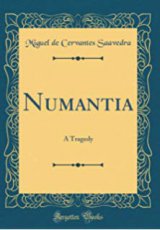The Siege of Numantia Page #2
The Siege of Numantia is a tragedy by Miguel de Cervantes set at the siege of Numantia. The play is divided into four acts. The dialogue is sometimes in tercets and sometimes in redondillas, but for the most part in octaves.
Those of our readers who desire to pursue the subject further would do well to consult the higher dramatic critics. Hallam, in his succinct "History of the Literature of the Middle Ages," devotes three pages to the analysis and elucidation of this remarkable drama, and his judgment both of its excellences and faults is at once shrewd, candid, and appreciative. Ticknor, while slightly protesting against the unmeasured praise bestowed upon it by the Germans, acknowledges its unique historical value, and praises especially its lighter portions, condemned by many as an excrescence, for their exquisite simplicity and truthfulness. Amongst the Germans, Bouterwek and Augustus W. Schlegel are especially enthusiastic in their eulogies. We extract from the latter's "History of Dramatic Literature" (Black's translation) the following passage, as just as it is elegantly expressed: "The Destruction of Numantia has altogether the elevation of the tragical cothurnus; and, from its unconscious and unlaboured approximation to antique grandeur and purity, forms a remarkable phenomenon in the history of modern poetry.... There is, if I may so speak, a sort of Spartan pathos in the piece; every single and personal consideration is swallowed up in the feeling of patriotism, and by allusions to the warlike fame of his nation in modern times he has contrived to connect the ancient history with the interests of his own day.... When we consider the energetical pathos in this drama we are constrained to consider it as merely accidental that Cervantes did not devote himself to this species of writing, and find room in it for the complete development of his inventive mind." Sismondi and such acute critics as Schack and Lemcke corroborate Schlegel's judgment in almost every respect. Among French writers such authorities as M. Royer, who has written an admirable prose translation of the Numantia, and M. Emile Chasles, whose Life of Cervantes is the most graphic of all biographies, have given very valuable and laudatory criticism. The list of critics' names might easily be extended, but enough has already been given to justify the importance we have attached to this unique work of Cervantes. This is not the place to allude to any other of Cervantes' dramatic works, or to estimate their value. We hope yet to have an opportunity of doing so when we present a translation of his selected Comedies and Interludes for the approval of English Cervantistas. Meanwhile we prefer that this translation of his Numantia should go forth alone. It was produced at first in stirring times when the Spanish power, that had hitherto held mastery in the world, was showing symptoms of declining vigour. This English translation comes forth in equally stirring times, when the power that supplanted the Spanish domination, and has so long ruled the seas, is called on to make a mighty effort to show that she can do so yet, despite of Teuton, Gaul, or Russ. The enemies of Old England are busily predicting for her a fate like that which overwhelmed Carthage or Numantia. We fear no such fate if England to herself be true. Still the call to patriotism is never out of place, and perhaps the British people who have taken Cervantes to their hearts as the genial, mirth-provoking humourist, may be disposed to show him like regard in his character of poet, soldier, and patriot. It is true the scene he presents, and the heroism he immortalizes are peculiarly Spanish; but Cervantes, though a Spaniard to the backbone, had thoughts that interest humanity, and the patriotic chord which he strikes in this drama may perchance find an echo even in our colder northern bosoms. At all events Cervantes was no dilettante soldier. If he talks of the horrors and glories of war and siege he talks of things he knew and had felt. In his early manhood he was one of those high-spirited youths (Mozos de gran brio), of good birth and breeding, who crowded the ranks of the Spanish army in Italy, to do service to their country and gain honour thereby. He had fought and bled at Lepanto, in the affair at Navarino, at the storming of Tunis and La Goleta. He was simply a private soldier and did his duty bravely as hundreds of his comrades did. Strange to say, it was only during his five years' captivity in Algiers that he was enabled to display his higher military qualities and especially his faculty of command. Amongst the 25,000 Spaniards in that den of horrors he at once took the foremost place. He was the leader in every daring plan of escape, and only failed at last through treachery. He was the originator of that desperate scheme for the seizure of Algiers by the uprising of the Christians, which was nipped in the bud by the faint-heartedness of Philip II., who feared to risk his fleet in such a glorious enterprise. But successful or not he was idolized by his comrades, and feared by his enslavers, who nevertheless would not touch his life, such was the charm his heroic spirit exercised. But his bearing as a man was more heroic still than his daring as a soldier. The written testimony of his comrades, still preserved, tells us how gentle he was in manners, how brave in heart; how generous to his needier brethren even out of his poverty; how tender to the captive children and how mindful of their welfare; how proud of his honour as a Spaniard, and steadfast in his faith as a Christian, while hundreds surrendered both in the sheer agony of despair. Cervantes escaped, as by a miracle, from a life-long slavery in Constantinople; but only to wage a life-long battle with adverse fate, and at length to die with a smile on his lips.
Translation
Translate and read this book in other languages:
Select another language:
- - Select -
- 简体中文 (Chinese - Simplified)
- 繁體中文 (Chinese - Traditional)
- Español (Spanish)
- Esperanto (Esperanto)
- 日本語 (Japanese)
- Português (Portuguese)
- Deutsch (German)
- العربية (Arabic)
- Français (French)
- Русский (Russian)
- ಕನ್ನಡ (Kannada)
- 한국어 (Korean)
- עברית (Hebrew)
- Gaeilge (Irish)
- Українська (Ukrainian)
- اردو (Urdu)
- Magyar (Hungarian)
- मानक हिन्दी (Hindi)
- Indonesia (Indonesian)
- Italiano (Italian)
- தமிழ் (Tamil)
- Türkçe (Turkish)
- తెలుగు (Telugu)
- ภาษาไทย (Thai)
- Tiếng Việt (Vietnamese)
- Čeština (Czech)
- Polski (Polish)
- Bahasa Indonesia (Indonesian)
- Românește (Romanian)
- Nederlands (Dutch)
- Ελληνικά (Greek)
- Latinum (Latin)
- Svenska (Swedish)
- Dansk (Danish)
- Suomi (Finnish)
- فارسی (Persian)
- ייִדיש (Yiddish)
- հայերեն (Armenian)
- Norsk (Norwegian)
- English (English)
Citation
Use the citation below to add this book to your bibliography:
Style:MLAChicagoAPA
"The Siege of Numantia Books." Literature.com. STANDS4 LLC, 2024. Web. 21 Dec. 2024. <https://www.literature.com/book/the_siege_of_numantia_60>.




Discuss this The Siege of Numantia book with the community:
Report Comment
We're doing our best to make sure our content is useful, accurate and safe.
If by any chance you spot an inappropriate comment while navigating through our website please use this form to let us know, and we'll take care of it shortly.
Attachment
You need to be logged in to favorite.
Log In